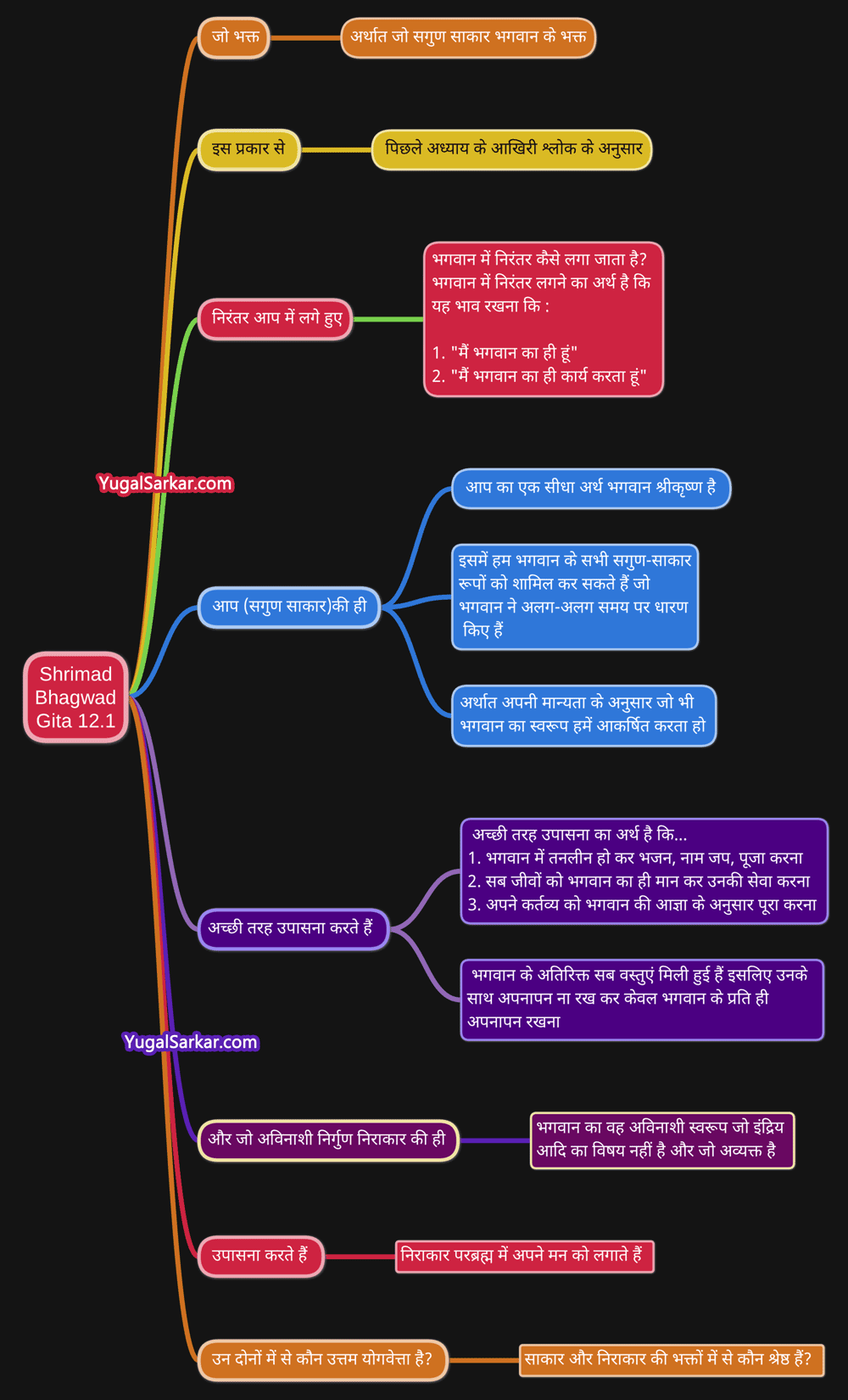Bhagavad Gita Chapter 12 Verse 1
भगवद् गीता अध्याय 12 श्लोक 1
अर्जुन उवाच
एवं सततयुक्ता ये भक्तास्त्वां पर्युपासते।
येचाप्यक्षरमव्यक्तं तेषां के योगवित्तमाः।।12.1।।

हिंदी अनुवाद - स्वामी तेजोमयानंद
।।12.1।। अर्जुन ने कहा -- जो भक्त? सतत युक्त होकर इस (पूर्वोक्त) प्रकार से आपकी उपासना करते हैं और जो भक्त अक्षर? और अव्यक्त की उपासना करते हैं? उन दोनों में कौन उत्तम योगवित् है।।
Kumara Vaishnava Sampradaya - Commentary
In the previous chapter the Supreme Lord Krishna, the possessor of all divine attributes as well as countless exalted qualities such as an ocean of mercy, compassion, affability, omniscience etc. and the source of all avatars or incarnations and expansions, being the ultimate object of worship to all who aspire for the path of bhakti or exclusive loving devotion unto the Supreme Lord Krishna; revealed His unlimited sovereign power of universal dominion in the form of His visvarupa or divine universal form after being requested by His devotee Arjuna. It has also been established that uninterrupted profound, sublime bhakti alone without cessation is the only possible way to realise the Supreme Lord in His ultimate nature and experience communion with Him. Now in this chapter the following three realities will be examined. 1) The inherent superiority of an aspirant performing bhakti involving meditation directly upon the Supreme Lord Himself as compared to meditation upon the atma or the eternal soul which only leads to atma tattva or realisation of the soul in order to attain the ultimate goal of all existence. This superiority of bhakti is measured in terms of absolute fulfilment of the ultimate goal and in the sublime felicity and bliss of performance. Bhakti or love of God is considered the fifth purusharthas above the other four ambitions of humans beings which are 1. Dharma or righteousness which consists of two parts first being the regular performance of Vedic activities and the second being performing actions which benefit all living entities such as freely providing fresh water and salt to all and protecting against all demoniac influences whenever they appear. 2. Artha or the righteous acquirement of wealth according to the Vedic scriptures without usury or deception. 3. Kama or enjoyment and pleasure in the material existence following the Vedic scriptures without perversion or degradation. 4. Moksa or liberation from material existence by atma tattva or liberation from material existence by bhakti realising the Supreme Lord direct. It should be noted that atma tattva is automatically an inherent part of bhakti and thus those blessed living entities who perform bhakti to the Supreme Lord Krishna or any of His authorised avatars do not have to make any separate or special effort to achieve this. 2) The method of realising the Supreme Lord will be given in verse two. 3) The aksaram or abstract, impersonal unmanifest path examined in verses 3,4,5 is applicable for those who are inept and unqualified. This ineptitude and lack of qualification is due to the absence of humbly approaching a spiritual master from one of the four authorised Vaisnava sampradayas or empowerd lines of disciplic succession and after being accepted by him and initiated being taught the fundamentals of bhakti. The superiority of bhakti or exclusive loving devotion to the Supreme Lord Krishna is made manifest by the superiority of He, Himself being the object of such loving devotion. This maxim of superiority was briefly stated by Lord Krishna in chapter six verse 47 where He states : Those with firm faith in the Vedic scriptures describing super-excellent devotion to Him and with hearts full of love dedicate all their actions to Him are yuktatamah the most superior of all. The words satata-yuktah meaning always engaged denotes ever devout towards the Supreme Lord being ever intent on communion with Him which is continuing the sentiments of the last verse in chapter 11. The words tvam paryupasate means direct worship of Lord Krishna and refers to deeming the Supreme Lord as the complete fulfilment of ones every ambition and desire. The Supreme Lord, the perfect, infallible one, the Sovereign Lord of all creation and the refuge of all cosmic glories, possessing unlimited attributes of exalted qualities such as divinity, omniscience, compassion, omnipotence, etc. Such ones are thy eternal adorers and always your beloved. Those other votaries are the worshippers of the abstract, impersonal, avyaktam or unmanifest and imperceptible. which is aksaram or imperishable. Such also reflect and contemplate upon the nature of the pratyagatma or individual soul which is imperishable also as well as being unmanifest in as much as it is indiscernible by the mind and imperceptible to any of the senses such as the eye or ear, etc. Of these two classes of aspirants which one is superior and most suitable for performing yoga or the science of the individual consciousness attaining communion with the ultimate consciousness. Inferring which one would achieve their respective goals most expediently. In verse seven Lord Krishna gives the definitive reply in answer to this query by succinctly revealing the most expeditious way to attain the ultimate goal.